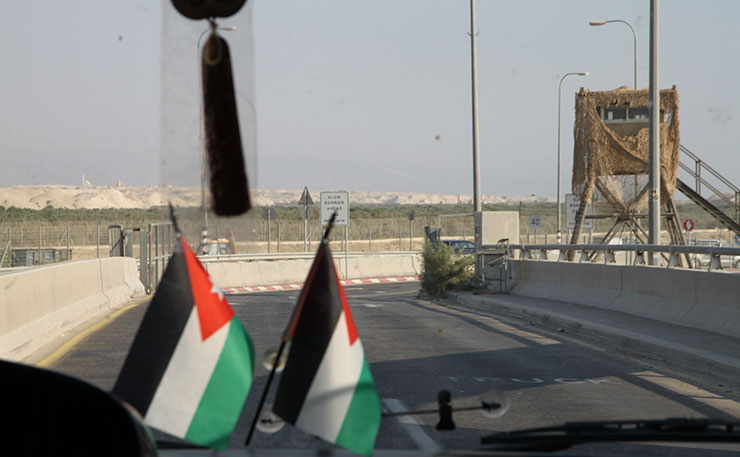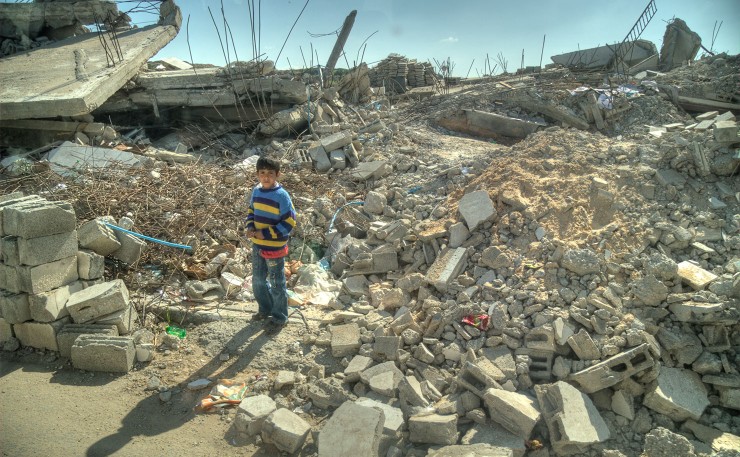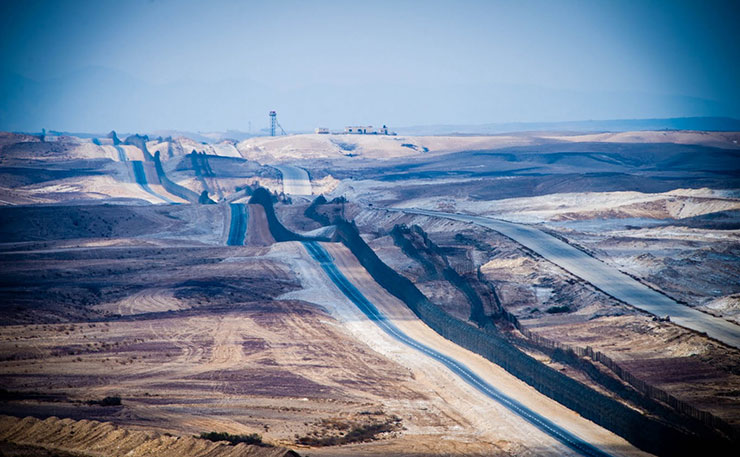Bureaucracies the world over have in-built cruelties, something which Palestinians in particular know all about, writes Professor Stuart Rees.
The humiliation experienced by the citizens of many countries occurs in encounters with officials who represent bureaucracies. When inquiring about their entitlements, these citizens may be ignored, belittled, told to wait, referred elsewhere, or, in the latest well-crafted indifference, told to go online.
Australian examples of failure to treat people with even a semblance of dignity can be seen in Centrelink’s robo-debt recovery scheme and in ASIO’s deceitful practice of refusing to explain why applicants have been denied refugee status. Such practice has become a ‘taken for granted’ feature of a culture concerned with power to protect secrecy, abuse human rights, keep officials invisible and never be held accountable.
These observations highlight a universal interest in humiliation, even in democracies. Such practice becomes even more systematic in parts of the world where human rights could be considered a joke, and vulnerable people of little consequence.
Gazan Citizens in Particular
There is much to learn from Centrelink and ASIO’s behaviour but also from the experiences of Palestinians from Gaza who are travelling home, or, in the case which follows, trying to leave Gaza to return to Australia.
The story begins in December 2016 when Rihab, a student at an Australian university decides to travel home to Gaza to visit her very sick mother. She takes her two-year-old son with her. Her husband stays behind in Australia.
Having the right papers is usually a key to successful encounters with bureaucracies, though there’s still a risk that the papers may be deemed insufficient, wrong, out-of-date or not recognized. Risk seems inherent in Palestinian passports, which also need an identity number, issued initially by the Israeli Army. The papers issued to Palestinians are referred to as Travel Documents.
Despite her experience of travelling from and to Gaza, Rihab soon discovered that in her passport, the word ‘pass’ could be variously interpreted.
En route from Jordan into Israel and then though the Eretz crossing to Gaza, Rihab was stopped at the Allenby Bridge on the Jordan/Israel border where Israeli soldiers confiscated the toddler’s papers. Being born in Australia, he did not have the ID number which, following the Oslo Peace accord signed in Washington, in September 1993, is inserted in Palestinians’ passports.

Then began Mad Hatter fiction-like developments, only they’re not fictitious. The child’s original birth certificate was Australian but he had to obtain a Palestinian birth certificate to indicate that he was not born in Palestine. Obtaining this birth certificate and accompanying ID number took three weeks.
Another Kafkaesque nightmare loomed. On her return journey from Gaza, Rihab would have to enter Jordan as well as Israel. On three occasions, each separated by three weeks, her application for permission to travel to Jordan was rejected with no explanation.
Jordanian authorities’ reasons for refusal could have involved any of the following: Suspicious intelligence services. Fear of terrorism. Overwhelmed by the numbers of refugees entering their country. In busy schedules, papers easily overlooked. Israel’s policy of imposing collective punishment on all Gazan citizens.
Such punishment coloured Rihab’s reunion with her mother. Rihab wrote, “I was finally with her. After three years of separation and two years of her chemotherapy, so different to the mother I know, the strong tall posture was replaced by a fragile figure. I was with her but not with her. There has not been a single day since I came here that I am not involved in paperwork and worry about when and how I would exit… I find it so unfair that after all I have done to be with her, I am not totally with her. I have become a concern for her not a means of giving her strength.”
In despair following three refusals for a permit to leave, Rihab wrote to me, “I am still trying to get all the papers and permits right. Would you be able to help? I would appreciate it.”
A Question of Advocacy
When dealing with officials who are invisible, shuffling papers somewhere in organisations which are impenetrable, advocates for the victims of bureaucracies have several options.
They can develop influential networks. They can publicize events in mainstream or social media. They can be patient and pursue diplomatic options. They must summon the energy to confront the issues every day until breakthroughs are made. They must give support to those who are denied their freedoms.
Following Rihab’s request for help, her efforts to leave were augmented by telephone calls, texts and emails sent by the Palestinian Embassy in Canberra, by Rihab’s husband, by myself, by a distant relative in Jordan and by an Australian journalist in the Middle East.
Most of these communications occurred between myself and cooperative staff in the Palestinian Embassy and between that office and the Jordanian Embassy. As a form of risk insurance, a senior Federal politician was also alerted in case it would be necessary to ask DFAT to intervene.
With a view to influencing people in positions of authority on Rihab’s behalf, my records show that 20 letters and a corresponding number of telephone calls and text messages were dispatched between February 16th and March 7th.

Staff from the Palestinian Embassy met with the Jordanian Ambassador to discuss Rihab’s case and subsequently wrote requesting a ‘no objection’ permit for Rihab.
My letter of February 17 to the Embassy and to a senior Federal politician said, “This looks like an horrendous jigsaw puzzle.” By the following day, Jordanian authorities had received details of Rihab and her son’s new passport. Rihab’s wait in Gaza continued.
On February 21, I wrote to the diplomats, a politician and friends of Rihab’s: “Matter of urgency: why must this young woman be further humiliated and stressed? In whose interests?”
After discussion between representatives of the respective Palestinian and Jordanian Embassies, I was advised not to make follow up telephone calls, “As this will not be useful and will only have a negative effect.” In common with Rihab in Gaza, I was also asked to wait.
By March 5, Rihab’s husband responded to the news that a request for a ‘No objection’ permit had been sent to Jordan, “But there’s no guarantee that this latest request will be accepted, so we could wait another 10 days.” Palestinian staff in Canberra agreed but noted, “Egypt has suddenly opened the Rafah crossing (to the south of Gaza), Rihab should try that option.”
Escape through Egypt and not through Israel & Jordan was now a possibility.
Through Rafah, Across Sinai To Cairo
Rihab takes up the story. “In anticipation that the Rafah Crossing might be opened, we had put our names down. On March 6th we headed to Rafah at 5am. We arrived at 6am and waited in a hall with hundreds of other travellers. Our name was listed for the sixth bus (to cross to the Egyptian side). We waited for four hours before they called our names to get into a bus. The bus took us to the Palestinian terminal, they stamped our passport, asked us to wait for another hour before they put us on a bus to get to the Egyptian terminal.
When we arrived at the Egyptian terminal, I realized that all the buses which had left before us were still there. I had no idea what I was supposed to do. I asked around. They told me I had to give my passport to Egyptian officers at one of the windows and wait for my name to be called. I then waited for four hours as other names were being called from other windows.”
A small child’s innocence somehow transcends adults’ desperation. Rihab recalls, “My two-year-old did not understand what was going on. He was socializing with the other travellers and running around like he was in a playground.

“But this ‘playground’ was so chaotic. I thought maybe I had done something wrong. People were desperate to hear their names called. They were sitting on the ground for hours. There were not enough chairs to accommodate all the people in the hall. I went back to the window and the officer asked me why I was going to Egypt. I said for study, showed him my student card, he gave me a 30 day visa to visit Egypt and asked me to wait to hear my name called again. I waited for another hour before they gave me back my passport and I was ready to go.”
We left the border to Sinai at about 4 pm. I was terrified that we might end up sleeping at the terminal but we got into a taxi before they imposed the curfew. We managed to share a taxi with other families. It was an almost 12-hour drive to Cairo. That trip used to take only five hours. There so many checkpoints, it seemed like every few minutes. The roads were unpaved. Our passports were checked at each checkpoint and our luggage inspected.
Adding Insult to Injury
Considerable financial costs were added to the psychological pressures. Although Rihab could stay with her family in Gaza, and no-one had to pay people smugglers, various authorities combined to make gains from another’s powerlessness. Each re-application for permission from the Jordanians cost $45. Two cancelled flights home cost Rihab’s husband $700 each.
His third purchase for a one-way ticket from Cairo to Australia was successful. Having arrived in Cairo, Rihab and her son boarded their flight home.
After Rihab landed in Australia, permission arrived to travel to Jordan. That still left the need to follow the Jordanian permit with requests for Israeli permission to leave Gaza, which could have meant that the whole sorry saga might begin again.
It might be argued that the dehumanising experiences of this brave young woman were not as dangerous or cruel as those endured by other powerless applicants for justice. That is not the point.
Cultures primed by fear of terrorism have been bolstered by countries which don’t care for international law or for human rights. Such indifference produces an entrenched system which enables powerful but invisible officials to do what they like.
Challenges to such a system can be made by insisting that the vulnerable should be treated with more than a touch of justice. Such challenges can be made by almost any citizens, and, as in this case, by cooperative and skilled diplomats.
In Australia, leading politicians could acknowledge a world-wide, systematic erosion of human rights.
Concern about Australia’s alleged energy crisis should take second place to the growing global indifference to human rights and the consequent degradation of vulnerable individuals. Rihab’s experiences represent the tip of an iceberg.
Donate To New Matilda
New Matilda is a small, independent media outlet. We survive through reader contributions, and never losing a lawsuit. If you got something from this article, giving something back helps us to continue speaking truth to power. Every little bit counts.





